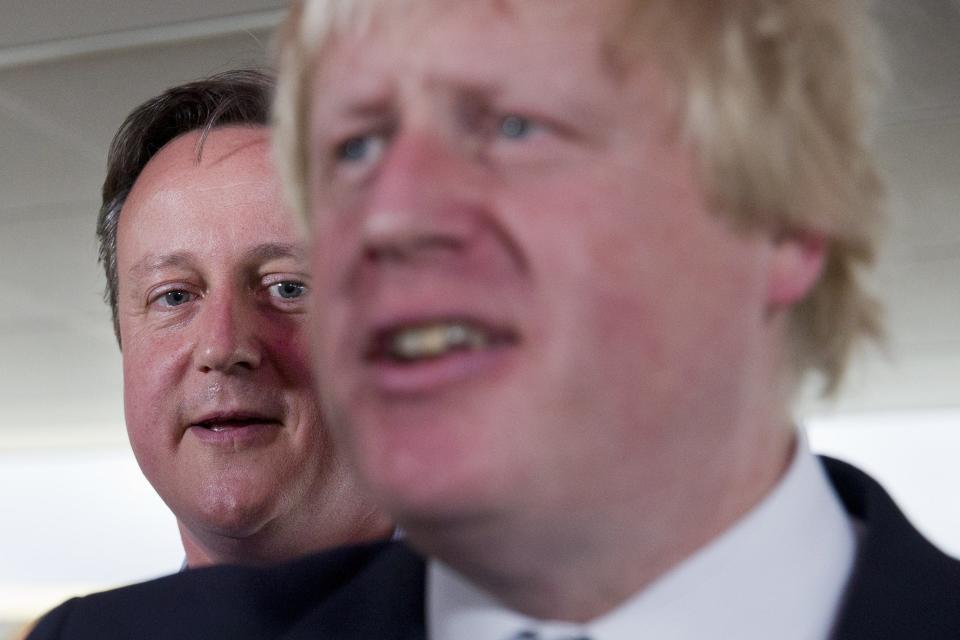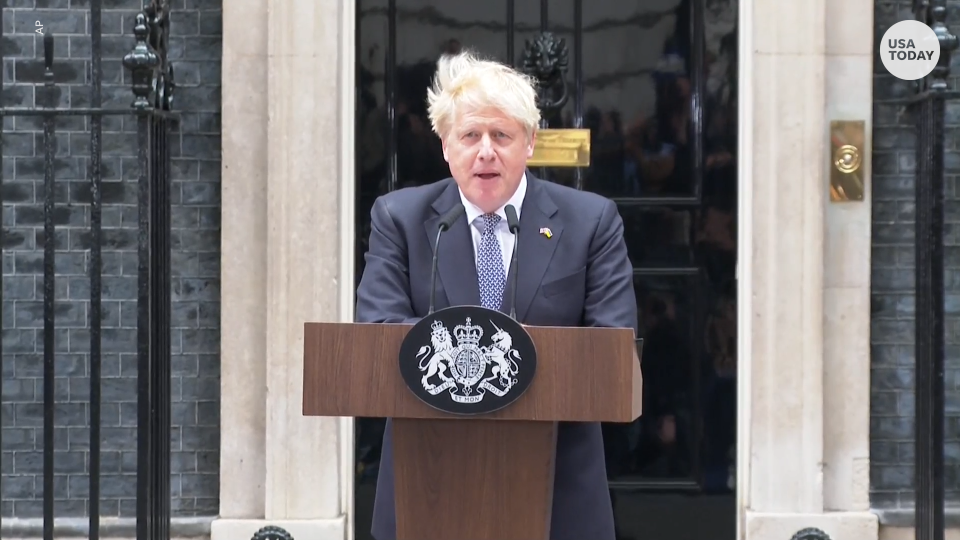From Parliament to mayor to prime minister: A timeline of Boris Johnson's political career
- Oops!Something went wrong.Please try again later.
- Oops!Something went wrong.Please try again later.
- Oops!Something went wrong.Please try again later.
Following a series of scandals, a recent no-confidence vote and several government resignations, British Prime Minister Boris Johnson announced Thursday he was going to step down.
The Conservative Party leader, who was once a two-term mayor of London, said he's "sad to be leaving the best job in the world, but thems the breaks." Here are some highlights of his political career.
Boris Johnson in Parliament
Johnson served in Parliament in the House of Commons from 2001-2008, representing the constituency of Henley, about 36 miles from London.
Elected mayor in 2008
In May 2008, he became London's mayor and built a high global profile as a cheerful ambassador for the city — an image exemplified when he got stuck on a zip line during the 2012 London Olympics, waving Union Jacks as he dangled in the air.
Boris Johnson embraces Brexit
In 2016, he became the co-leader of the campaign to take Britain out of the European Union, opposing then-Prime Minister David Cameron, also a conservative.
Cameron resigned after voters approved Brexit in a national referendum in June 2016.

Johnson serves under Theresa May
From 2016 through 2018, Johnson was foreign secretary under Prime Minister Theresa May, who succeeded Cameron.
He stepped down in July 2018, opposing May's "soft" Brexit strategy that would keep a close connection with the EU.
In June 2019, May resigned as Conservative Party leader due to her failure to convince Parliament to support the Brexit agreement she negotiated with the EU.
Johnson wins majority, becomes prime minister
Boris Johnson took office as prime minister in July 2019, replacing May. The incoming leader faced pressure to get the United Kingdom to leave the European Union.
In December, of 2019, Johnson's Conservative Party won an 80-seat majority in the general election, which gave him the backing to push through Brexit legislation. The victory made Johnson the most electorally successful Conservative leader since Margaret Thatcher.
Under his leadership, the United Kingdom formally left the European Union in January 2020.
Navigating Brexit: Breakthrough: UK and EU reach post-Brexit trade agreement
How did Johnson handle coronavirus pandemic?
In March 2020, when COVID-19 hit worldwide, Johnson called for a U.K. lockdown. Under COVID-19 restrictions, Britons were not allowed to leave their homes and were banned from socializing.
Britain shut down: Britain's pubs, museums are reopening and travel is allowed even as India coronavirus variant is on the rise
Some limits, according to BBC News, meant people could not leave their homes without a reasonable excuse and could only meet one person at a time outside. In addition, people could not travel abroad or see dying family members at hospitals.
Party gate: What we know about Boris Johnson and Britain's 'party gate' scandal

Johnson's COVID parties, soon to be known as 'Partygate'
When the U.K. was under restrictive lockdowns In the mid-2020s, alcohol-fueled illegal parties took place inside Johnson's office at No. 10 Downing Street, and he participated in one party for him.
Investigations of the "party gate" scandal were not known publically until late last year.
Johnson apologized in May, after he revealed that he was among dozens of people who paid a police fine for attending lockdown-breaching parties and gatherings. That made him the first British leader to break the law. He said he took "full responsibility" but also insisted it was time to "move on" and focus on Britain's battered economy and the war in Ukraine.
But many members of his own party increasingly looked at Johnson as a liability.
Johnson see as liability: What we know about Boris Johnson and Britain's 'partygate' scandal
Boris Johnson survives no confidence vote
Johnson made it through a no-confidence vote in June called by members of his party who wanted to oust him as a leader, partly over allegations of drunken government parties held during COVID-19 lockdowns.
Resignation: Boris Johnson to resign as UK prime minister after deluge of scandals stirs clamor for his ouster
Johnson announces intent to resign
Johnson's decision to resign came days after turmoil triggered by his explanations of what he knew about sexual misconduct allegations that involved one of his allies.
Two of Johnson's top Cabinet ministers quit earlier this week, followed by more than 30 others who said they could no longer serve under his leadership and urged him to resign.
Contributing: The Associate Press, Michael Collins, Kim Hjelmgaard

This article originally appeared on USA TODAY: Boris Johnson's political career: 9 key moments

